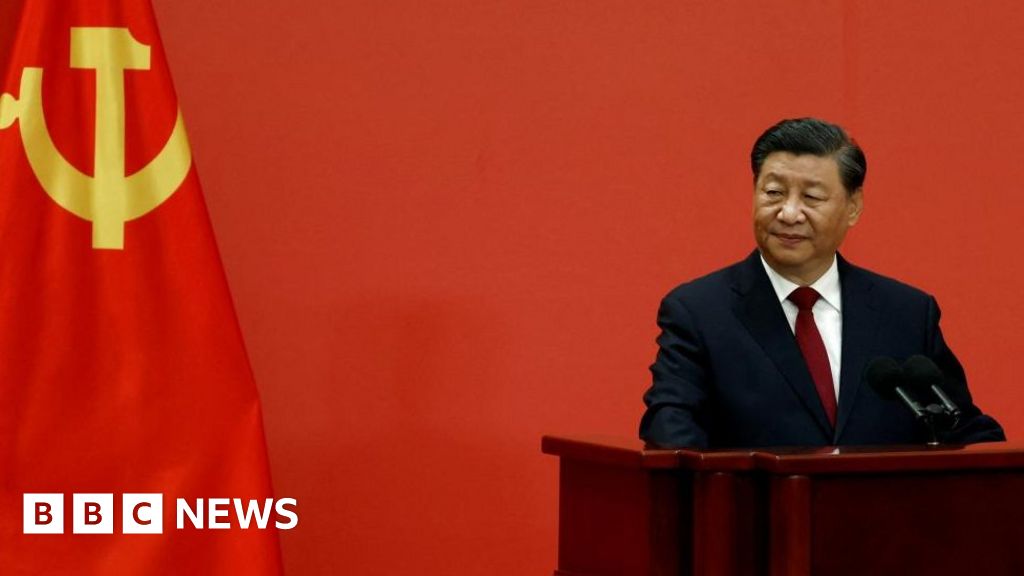 China tightens Xi Jinping’s powers against the West with new law Published
China tightens Xi Jinping’s powers against the West with new law Published
1 hour ago
Share
close panel Share page
Copy link About sharing
Image source, Reuters Image caption, China’s new foreign relations law adds to Xi Jinping’s vast powers By Kelly Ng BBC News China is adding to Xi Jinping’s vast powers with a new law that will assert Beijing’s interests on the world stage.
The law threatens to punish entities that act in ways “detrimental” to China’s interests but does not specify which lines should not be crossed.
Experts say the law underscores China’s aggressive diplomacy, but how actively it will be enforced when it takes effect on 1 July remains to be seen.
After all, China has been keen to court foreign investment post Covid.
Jacques deLisle, a law and political science professor from the University of Pennsylvania, said much of the law is “relatively empty rhetoric and largely familiar” but it spells a more assertive foreign policy and stronger pushback against the US.
State media outlet The Global Times called the law a “key step to enrich the legal toolbox against Western hegemony”.
Dr Chong Ja-Ian, a non-resident scholar at Carnegie China, said it was a “signal” of Beijing’s intention to “actively pursue their interests in ways that include more coercion and pressure, even as they hold out the attraction of cooperation and economic gains”.
China’s leaders tread an “inherent tension” between their pursuit of economic development and protection of national security and interests, said Manoj Kewalramani, who leads the China Studies Programme at Indian think tank the Takshashila Institution.
“This push and pull is likely to continue,” he said.
Relations between Beijing and Washington in particular have been strained in recent years, with the two superpowers exchanging a series of tit-for-tat trade sanctions.
Chinese authorities have taken a series of actions against Western firms, including raiding and shuttering the local offices of several US-headquartered consulting firms this year.
China police question staff at US firm Bain & Company China raids another consultancy in anti-spy crackdown Mintz Group staff detained in Beijing after raid These are widely perceived as retaliatory moves to growing trade and technology restrictions from the US.
Last month, it banned products made by US memory chip giant Micron .
Dr Chong said the new foreign relations law could result in more international compliance with China’s interests, but could also lead to pushback from other governments.
“Foreign businesses may wish to reconsider their exposure to the Chinese market or public positions they take, including political ones, if they haven’t already.
“The legislation provides more legal basis for the raids and investigations of foreign firms that have already been happening,” he said.
Still, the law does not guarantee that China will take these stronger actions.
Top business executives from the US, including Elon Musk and JPMorgan’s Jamie Dimon have visited China in recent weeks emphasising China’s importance to the US economy.
Experts say that how the law defines China’s foreign relations in the context of ideology is particularly striking.
“The People’s Republic of China conducts foreign relations to uphold its system of socialism with Chinese characteristics, safeguard its sovereignty, unification and territorial integrity, and promote its economic and social development,” the law states.
It adds that China conducts foreign relations “under the guidance of” the political ideologies of Xi Jinping , Mao Zedong, Deng Xiaoping and Marxism-Leninism, among others.
The law puts in writing for the first time that it is the ruling Communist Party, instead of the state, that directs foreign policy – it also represents Mr Xi’s tightening grip on power.
“[The law] is strikingly explicit on party leadership over foreign relations, underscoring the Xi era trends of migration of power – from the state to the party, and within the party, to Xi,” said Dr deLisle.
China’s top diplomat Wang Yi called it “an important measure to strengthen the Communist Party Central Committee’s centralised and unified leadership over foreign affairs,” according to an editorial published on Thursday in state-run newspaper People’s Daily.
Mr Kewalramani said the new law could, however, stifle discussion and disagreements on foreign policy issues.
But, he added, its overall implications can only be understood in time, depending on the courts’ interpretation of the legislation and the punitive costs that are imposed.
Related Topics Xi Jinping Asia China-US relations More on this story China raids another consultancy in anti-spy crackdown
Published 9 May
US firms ‘more negative’ about doing business in China
Published 23 March
China brings in new law to fight Trump’s sanctions
Published 11 January 2021.
